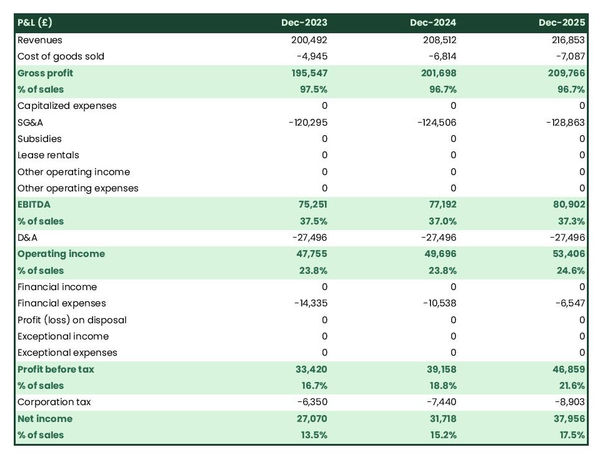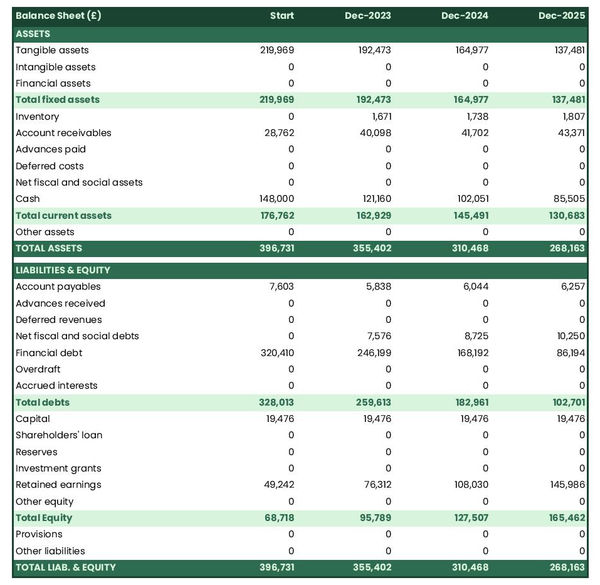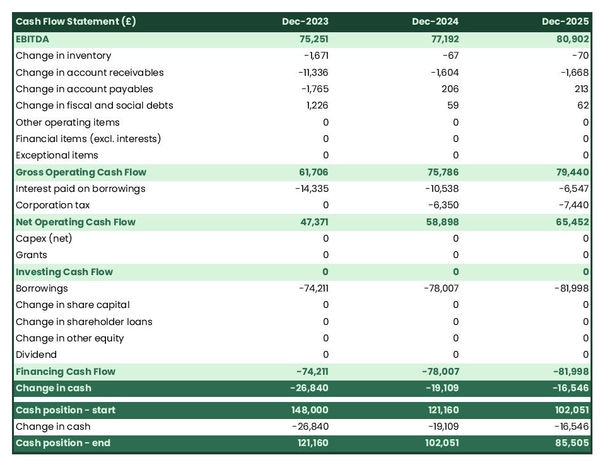How to write a business plan for a television production company?

Putting together a business plan for a television production company can be daunting - especially if you're creating a business for the first time - but with this comprehensive guide, you'll have the necessary tools to do it confidently.
We will explore why writing one is so important in both starting up and growing an existing television production company, as well as what should go into making an effective plan - from its structure to content - and what tools can be used to streamline the process and avoid errors.
Without further ado, let us begin!
Why write a business plan for a television production company?
Understanding the document's scope and goals will help you easily grasp its structure and content. Before diving into the specifics of the plan, let's take a moment to explore the key reasons why having a television production company business plan is so crucial.
To have a clear roadmap to grow the business
Small businesses rarely experience a constant and predictable environment. Economic cycles go up and down, while the business landscape is mutating constantly with new regulations, technologies, competitors, and consumer behaviours emerging when we least expect it.
In this dynamic context, it's essential to have a clear roadmap for your television production company. Otherwise, you are navigating in the dark which is dangerous given that - as a business owner - your capital is at risk.
That's why crafting a well-thought-out business plan is crucial to ensure the long-term success and sustainability of your venture.
To create an effective business plan, you'll need to take a step-by-step approach. First, you'll have to assess your current position (if you're already in business), and then identify where you'd like your television production company to be in the next three to five years.
Once you have a clear destination for your television production company, you'll focus on three key areas:
- Resources: you'll determine the human, equipment, and capital resources needed to reach your goals successfully.
- Speed: you'll establish the optimal pace at which your business needs to grow if it is to meet its objectives within the desired timeframe.
- Risks: you'll identify and address potential risks you might encounter along the way.
By going through this process regularly, you'll be able to make informed decisions about resource allocation, paving the way for the long-term success of your business.
Need a convincing business plan?
The Business Plan Shop makes it easy to create a financial forecast to assess the potential profitability of your projects, and write a business plan that’ll wow investors.

To get visibility on future cash flows
If your small television production company runs out of cash: it's game over. That's why we often say "cash is king", and it's crucial to have a clear view of your television production company's future cash flows.
So, how can you achieve this? It's simple - you need to have an up-to-date financial forecast.
The good news is that your television production company business plan already includes a financial forecast (which we'll discuss further in this guide). Your task is to ensure it stays current.
To accomplish this, it's essential to regularly compare your actual financial performance with what was planned in your financial forecast. Based on your business's current trajectory, you can make adjustments to the forecast.
By diligently monitoring your television production company's financial health, you'll be able to spot potential financial issues, like unexpected cash shortfalls, early on and take corrective actions. Moreover, this practice will enable you to recognize and capitalize on growth opportunities, such as excess cash flow enabling you to expand to new locations.
To secure financing
A detailed business plan becomes a crucial tool when seeking financing from banks or investors for your television production company.
Investing and lending to small businesses are very risky activities given how fragile they are. Therefore, financiers have to take extra precautions before putting their capital at risk.
At a minimum, financiers will want to ensure that you have a clear roadmap and a solid understanding of your future cash flows (like we just explained above). But they will also want to ensure that your business plan fits the risk/reward profile they seek.
This will off-course vary from bank to bank and investor to investor, but as a rule of thumb. Banks will want to see a conservative financial management style (low risk), and they will use the information in your business plan to assess your borrowing capacity — the level of debt they think your business can comfortably handle — and your ability to repay the loan. This evaluation will determine whether they'll provide credit to your television production company and the terms of the agreement.
Whereas investors will carefully analyze your business plan to gauge the potential return on their investment. Their focus lies on evidence indicating your television production company's potential for high growth, profitability, and consistent cash flow generation over time.
Now that you recognize the importance of creating a business plan for your television production company, let's explore what information is required to create a compelling plan.
Need a convincing business plan?
The Business Plan Shop makes it easy to create a financial forecast to assess the potential profitability of your projects, and write a business plan that’ll wow investors.

Information needed to create a business plan for a television production company
You need the right data in order to project sales, investments and costs accurately in the financial forecast of your television production company business plan.
Below, we'll cover three key pieces of information you should gather before drafting your business plan.
Carrying out market research for a television production company
Carrying out market research before writing a business plan for a television production company is essential to ensure that the financial projections are accurate and realistic.
Market research helps you gain insight into your target customer base, competitors, pricing strategies and other key factors which can have an impact on the commercial success of your business.
In particular, it is useful in forecasting revenue as it provides valuable data regarding potential customers’ spending habits and preferences.
Your market research might reveal that viewers may be looking for more educational programming, such as documentaries or biographies. Additionally, your research might show that viewers might be interested in shows with a modern, edgy feel, such as dark comedies or crime dramas.
This information can then be used to create more accurate financial projections which will help investors make informed decisions about investing in your television production company.
Developing the marketing plan for a television production company
Before delving into your television production company business plan, it's imperative to budget for sales and marketing expenses.
To achieve this, a comprehensive sales and marketing plan is essential. This plan should provide an accurate projection of the necessary actions to acquire and retain customers.
Additionally, it will outline the required workforce to carry out these initiatives and the corresponding budget for promotions, advertising, and other marketing endeavours.
By budgeting accordingly, you can ensure that the right resources are allocated to these vital activities, aligning them with the sales and growth objectives outlined in your business plan.
The staffing and capital expenditure requirements of a television production company
Whether you are starting or expanding a television production company, it is important to have a clear plan for recruitment and capital expenditures (investment in equipment and real estate) in order to ensure the success of the business.
Both the recruitment and investment plans need to be coherent with the timing and level of growth planned in your forecast, and require appropriate funding.
Staffing costs for a television production company can include hiring producers, directors, camera operators, sound engineers, and editors, as well as paying for actors, extras, and other staff members. Equipment costs can include cameras, sound and lighting equipment, editing software, and other production related tools.
In order to create a realistic financial forecast, you will also need to consider the other operating expenses associated with running the business on a day-to-day basis (insurance, bookkeeping, etc.).
Once you have all the necessary information to create a business plan for your television production company, it is time to start creating your financial forecast.
Need a convincing business plan?
The Business Plan Shop makes it easy to create a financial forecast to assess the potential profitability of your projects, and write a business plan that’ll wow investors.

What goes into your television production company's financial forecast?
The objective of the financial forecast of your television production company's business plan is to show the growth, profitability, funding requirements, and cash generation potential of your business over the next 3 to 5 years.
The four key outputs of a financial forecast for a television production company are:
- The profit and loss (P&L) statement,
- The projected balance sheet,
- The cash flow forecast,
- And the sources and uses table.
Let's look at each of these in a bit more detail.
The projected P&L statement
The projected P&L statement for a television production company shows how much revenue and profits your business is expected to generate in the future.

Ideally, your television production company's P&L statement should show:
- Healthy growth - above inflation level
- Improving or stable profit margins
- Positive net profit
Expectations will vary based on the stage of your business. A startup will be expected to grow faster than an established television production company. And similarly, an established company should showcase a higher level of profitability than a new venture.
The projected balance sheet of your television production company
The balance sheet for a television production company is a financial document that provides a snapshot of your business’s financial health at a given point in time.
It shows three main components: assets, liabilities and equity:
- Assets: are resources owned by the business, such as cash, equipment, and accounts receivable (money owed by clients).
- Liabilities: are debts owed to creditors and other entities, such as accounts payable (money owed to suppliers) and loans.
- Equity: includes the sums invested by the shareholders or business owners and the cumulative profits and losses of the business to date (called retained earnings). It is a proxy for the value of the owner's stake in the business.

Examining the balance sheet is important for lenders, investors, or other stakeholders who are interested in assessing your television production company's liquidity and solvency:
- Liquidity: assesses whether or not your business has sufficient cash and short-term assets to honour its liabilities due over the next 12 months. It is a short-term focus.
- Solvency: assesses whether or not your business has the capacity to repay its debt over the medium-term.
Looking at the balance sheet can also provide insights into your television production company's investment and financing policies.
In particular, stakeholders can compare the value of equity to the value of the outstanding financial debt to assess how the business is funded and what level of financial risk has been taken by the owners (financial debt is riskier because it has to be repaid, while equity doesn't need to be repaid).
The cash flow forecast
As we've seen earlier in this guide, monitoring future cash flows is the key to success and the only way of ensuring that your television production company has enough cash to operate.
As you can expect showing future cash flows is the main role of the cash flow forecast in your television production company business plan.

It is best practice to organise the cash flow statement by nature in order to show the cash impact of the following areas:
- Cash flow generated from operations: the operating cash flow shows how much cash is generated or consumed by the business's commercial activities
- Cash flow from investing activities: the investing cash flow shows how much cash is being invested in capital expenditure (equipment, real estate, etc.) either to maintain the business's equipment or to expand its capabilities
- Cash flow from financing activities: the financing cash flow shows how much cash is raised or distributed to financiers
Looking at the cash flow forecast helps you to make sure that your business has enough cash to keep running, and can help you anticipate potential cash shortfalls.
Your television production company business plan will normally include both yearly and monthly cash flow forecasts so that the readers can view the impact of seasonality on your business cash position and generation.
The initial financing plan
The initial financing plan - also called a sources and uses table - is an important tool when starting a television production company.
It shows where the money needed to set up the business will come from (sources) and how it will be allocated (uses).

Having this table helps understand what costs are involved in setting up the television production company, how the risks are distributed between the shareholders and the lenders, and what will be the starting cash position (which needs to be sufficient to sustain operations until the business breaks even).
Now that the financial forecast of a television production company business plan is understood, let's focus on what goes into the written part of the plan.
Need a convincing business plan?
The Business Plan Shop makes it easy to create a financial forecast to assess the potential profitability of your projects, and write a business plan that’ll wow investors.

The written part of a television production company business plan
The written part of a television production company business plan is composed of 7 main sections:
- The executive summary
- The presentation of the company
- The products and services
- The market analysis
- The strategy
- The operations
- The financial plan
Throughout these sections, you will seek to provide the reader with the details and context needed for them to form a view on whether or not your business plan is achievable and your forecast a realistic possibility.
Let's go through the content of each section in more detail!
1. The executive summary
The first section of your television production company's business plan is the executive summary which provides, as its name suggests, an enticing summary of your plan which should hook the reader and make them want to know more about your business.
When writing the executive summary, it is important to provide an overview of the business, the market, the key financials, and what you are asking from the reader.
Start with a brief introduction of the business, its name, concept, location, how long it has been in operation, and what makes it unique. Mention any services or products you plan to offer and who you sell to.
Then you should follow with an overview of the addressable market for your television production company, current trends, and potential growth opportunities.
You should then include a summary of your key financial figures such as projected revenues, profits, and cash flows.
Finally, you should detail any funding requirements in the ask section.
2. The presentation of the company
As you build your television production company business plan, the second section deserves attention as it delves into the structure and ownership, location, and management team of your company.
In the structure and ownership part, you'll provide valuable insights into the legal structure of the business, the identities of the owners, and their respective investments and ownership stakes. This level of transparency is vital, particularly if you're seeking financing, as it clarifies which legal entity will receive the funds and who holds the reins of the business.
Moving to the location part, you'll offer a comprehensive view of the company's premises and articulate why this specific location is strategic for the business, emphasizing factors like catchment area, accessibility, and nearby amenities.
When describing the location of your television production company, you may highlight its access to a wide range of talent, resources, and infrastructure. The area could offer access to a competitive labor pool with a variety of skill sets. Additionally, the area might be home to a variety of vendors and suppliers that could provide the necessary equipment and services for production. The area could also offer lower costs for overhead and production expenses, making it an attractive option for a financier. Finally, the area might be home to a variety of production-friendly incentives that could make it a desirable location to create a television production company.
Lastly, you should introduce your esteemed management team. Provide a thorough explanation of each member's role, background, and extensive experience.
It's equally important to highlight any past successes the management team has achieved and underscore the duration they've been working together. This information will instil trust in potential lenders or investors, showcasing the strength and expertise of your leadership team and their ability to deliver the business plan.
3. The products and services section
The products and services section of your business plan should include a detailed description of the offerings that your company provides to its customers.
For example, your television production company might offer services such as media production, video editing, and live streaming. Media production is a great way to create videos that can be used for marketing campaigns, product launches, or for entertainment. Video editing is a service that can be used to arrange shots, add music, and create special effects. Live streaming allows customers to watch events live, such as conferences, concerts, and ceremonies. These services provide customers with the ability to create and share content in a professional and timely manner.
When drafting this section, you should be precise about the categories of products or services you sell, the types of customers you are targeting and how customers can buy them.
4. The market analysis
When you present your market analysis in your television production company business plan, it's crucial to include detailed information about customers' demographics and segmentation, target market, competition, barriers to entry, and any relevant regulations.
The main objective of this section is to help the reader understand the size and attractiveness of the market while demonstrating your solid understanding of the industry.
Begin with the demographics and segmentation subsection, providing an overview of the addressable market for your television production company, the key trends in the marketplace, and introducing different customer segments along with their preferences in terms of purchasing habits and budgets.
Next, focus on your target market, zooming in on the specific customer segments your television production company aims to serve and explaining how your products and services fulfil their distinct needs.
For example, your target market might include young adults in their twenties. This demographic typically has more disposable income to spend on entertainment and leisure activities, making them attractive to television production companies. They also tend to consume media content more frequently than other age groups, making them ideal for television production companies to target.
Then proceed to the competition subsection, where you introduce your main competitors and highlight what sets you apart from them.
Finally, conclude your market analysis with an overview of the key regulations applicable to your television production company.
Need a convincing business plan?
The Business Plan Shop makes it easy to create a financial forecast to assess the potential profitability of your projects, and write a business plan that’ll wow investors.

5. The strategy section
When crafting the strategy section of your business plan for your television production company, it's important to cover several key aspects, including your competitive edge, pricing strategy, sales & marketing plan, milestones, and risks and mitigants.
In the competitive edge subsection, clearly explain what sets your company apart from competitors. This is particularly critical if you're a startup, as you'll be trying to establish your presence in the marketplace among entrenched players.
The pricing strategy subsection should demonstrate how you aim to maintain profitability while offering competitive prices to your customers.
For the sales & marketing plan, outline how you plan to reach and acquire new customers, as well as retain existing ones through loyalty programs or special offers.
In the milestones subsection, detail what your company has achieved thus far and outline your primary objectives for the coming years by including specific dates for expected progress. This ensures everyone involved has clear expectations.
Lastly, in the risks and mitigants subsection, list the main risks that could potentially impact the execution of your plan. Explain the measures you've taken to minimize these risks. This is vital for investors or lenders to feel confident in supporting your venture - try to proactively address any objection they might have.
Your television production company could face a variety of risks. For example, you may encounter technical difficulties during your filming and editing process, which could lead to delays in production and cause you to miss deadlines. Additionally, you might be dealing with a limited budget, which could lead to difficulties hiring the necessary crew or securing the necessary equipment for the production.
6. The operations section
The operations of your television production company must be presented in detail in your business plan.
The first thing you should cover in this section is your staffing team, the main roles, and the overall recruitment plan to support the growth expected in your business plan. You should also outline the qualifications and experience necessary to fulfil each role, and how you intend to recruit (using job boards, referrals, or headhunters).
You should then state the operating hours of your television production company - so that the reader can check the adequacy of your staffing levels - and any plans for varying opening times during peak season. Additionally, the plan should include details on how you will handle customer queries outside of normal operating hours.
The next part of this section should focus on the key assets and IP required to operate your business. If you depend on any licenses or trademarks, physical structures (equipment or property) or lease agreements, these should all go in there.
You could have key assets such as the scripts and screenplays for your television shows, as well as the characters and storylines that you have created. These are Intellectual Property that you may be able to monetise in the future. Additionally, you might have the rights to the music that you use in your productions, as well as the sound effects and audio recordings. These are all key assets that you could use to further your television production company.
Finally, you should include a list of suppliers that you plan to work with and a breakdown of their services and main commercial terms (price, payment terms, contract duration, etc.). Investors are always keen to know if there is a particular reason why you have chosen to work with a specific supplier (higher-quality products or past relationships for example).
7. The presentation of the financial plan
The financial plan section is where we will include the financial forecast we talked about earlier in this guide.
Now that you have a clear idea of the content of a television production company business plan, let's look at some of the tools you can use to create yours.
Need a convincing business plan?
The Business Plan Shop makes it easy to create a financial forecast to assess the potential profitability of your projects, and write a business plan that’ll wow investors.

What tool should I use to write my television production company's business plan?
In this section, we will be reviewing the two main options for writing a television production company business plan efficiently:
- Using specialized software,
- Outsourcing the drafting to the business plan writer.
Using an online business plan software for your television production company's business plan
The modern and most efficient way to write a television production company business plan is to use business plan software.
There are several advantages to using specialized software:
- You can easily create your financial forecast by letting the software take care of the financial calculations for you without errors
- You are guided through the writing process by detailed instructions and examples for each part of the plan
- You can access a library of dozens of complete business plan samples and templates for inspiration
- You get a professional business plan, formatted and ready to be sent to your bank or investors
- You can easily track your actual financial performance against your financial forecast
- You can create scenarios to stress test your forecast's main assumptions
- You can easily update your forecast as time goes by to maintain visibility on future cash flows
- You have a friendly support team on standby to assist you when you are stuck
If you're interested in using this type of solution, you can try The Business Plan Shop for free by signing up here.
Hiring a business plan writer to write your television production company's business plan
Outsourcing your television production company business plan to a business plan writer can also be a viable option.
Business plan writers are experienced in writing business plans and adept at creating financial forecasts without errors. Furthermore, hiring a consultant can save you time and allow you to focus on the day-to-day operations of your business.
However, hiring business plan writers is expensive as you are paying for the software used by the consultant, plus their time, and their profit margin of course.
From experience, you need to budget at least £1.5k ($2.0k) excluding tax for a complete business plan, more if you need to make changes after the initial version (which happens frequently after the initial meetings with lenders or investors).
You also need to be careful when seeking investment. Investors want their money to be used to grow the business, not spent on consulting fees. Therefore, the amount you spend on business plan writing services (and other consulting services such as legal services) needs to be negligible relative to the amount raised.
The other drawback is that you usually don't own the business plan itself: you just get the output, while the actual document is saved in the consultant's business plan software - which makes it difficult to maintain the document up to date without hiring the consultant on a retainer.
For these reasons, outsourcing the television production company business plan to a business plan writer should be considered carefully, weighing both the advantages and disadvantages of hiring outside help.
Ultimately, it may be the right decision for some businesses, while others may find it beneficial to write their business plan using online software.
Need a convincing business plan?
The Business Plan Shop makes it easy to create a financial forecast to assess the potential profitability of your projects, and write a business plan that’ll wow investors.

Why not create your television production company's business plan using Word or Excel?
I must advise against using Microsoft Excel and Word (or their Google, Apple, or open-source equivalents) to write your television production company business plan. Let me explain why.
Firstly, creating an accurate and error-free financial forecast on Excel (or any spreadsheet) is highly technical and requires a strong grasp of accounting principles and financial modelling skills. It is, therefore, unlikely that anyone will fully trust your numbers unless you have both a degree in finance and accounting and significant financial modelling experience, like us at The Business Plan Shop.
Secondly, relying on spreadsheets is inefficient. While it may have been the only option in the past, technology has advanced significantly, and software can now perform these tasks much faster and with greater accuracy. With the rise of AI, software can even help us detect mistakes in forecasts and analyze the numbers for better decision-making.
And with the rise of AI, software is also becoming smarter at helping us detect mistakes in our forecasts and helping us analyse the numbers to make better decisions.
Moreover, software makes it easier to compare actuals versus forecasts and maintain up-to-date forecasts to keep visibility on future cash flows, as we discussed earlier in this guide. This task is cumbersome when using spreadsheets.
Now, let's talk about the written part of your television production company business plan. While it may be less error-prone, using software can bring tremendous gains in productivity. Word processors, for example, lack instructions and examples for each part of your business plan. They also won't automatically update your numbers when changes occur in your forecast, and they don't handle formatting for you.
Overall, while Word or Excel may seem viable for some entrepreneurs to create a business plan, it's by far becoming an antiquated way of doing things.
Takeaways
- A business plan has 2 complementary parts: a financial forecast showcasing the expected growth, profits and cash flows of the business; and a written part which provides the context needed to judge if the forecast is realistic and relevant.
- Having an up-to-date business plan is the only way to keep visibility on your television production company's future cash flows.
- Using business plan software is the modern way of writing and maintaining business plans.
We hope that this practical guide gave you insights on how to write the business plan for your television production company. Do not hesitate to get in touch with our team if you still have questions.
Also on The Business Plan Shop
- In-depth business plan structure
- Business plan cost explained
- Guide to business plan milestones
- How to write the risks and mitigants section of your business plan?
- Key steps to write a business plan?
- Free business plan template
Know someone who owns or wants to start a television production company? Share this article with them!




